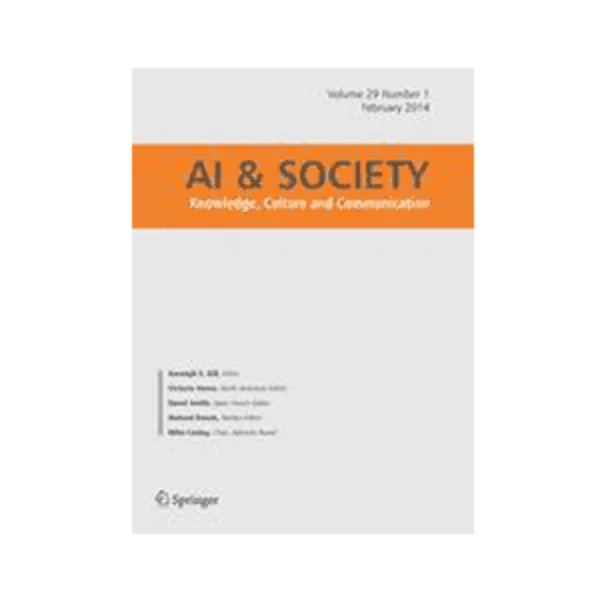-
cognitive revolution, virtuality and good life
جزئیات بیشتر مقاله- تاریخ ارائه: 1392/07/24
- تاریخ انتشار در تی پی بین: 1392/07/24
- تعداد بازدید: 1049
- تعداد پرسش و پاسخ ها: 0
- شماره تماس دبیرخانه رویداد: -
we are living in an era when the focus of human relationships with the world is shifting from execution and physical impact to control and cognitive/informational interaction. this emerging, increasingly informational world is our new ecology, an infosphere that presents the grounds for a cognitive revolution based on interactions in networks of biological and artificial, intelligent agents. after the industrial revolution, which extended the human body through mechanical machinery, the cognitive revolution extends the human mind/cognition through information-processing machinery. these novel circumstances come with new qualities and preferences demanding new conceptualizations. we have some work ahead of us to establish value systems and practices extended from the real to the increasingly virtual/info-computational. this paper first presents a current view of the virtual versus the real and then offers an interpretation framework based on an info-computational understanding of cognition in which agency implies computational processing of informational structures of the world as an infosphere. the notion of “good life” is discussed in light of different ideals of well-being in the infosphere, connecting virtuality as a space of potential and alternative worlds for an agent for whom the reality is a space of actual experiences, in the sense of deleuze. even though info-computational framework enables us to see both the real world and the diversity of virtual worlds in terms of computational processes on informational structures, based on a distinct layered cognitive architecture of all physical agents, there is clear difference between potential worlds of the virtual and actual agent’s experiences made in the real. info-computationalism enables insight into the mechanisms of infosphere and elucidates its importance as cognitively predominant environment and communication media. the conclusion is that by cocooning ourselves in an elaborate info-computational infrastructure of the virtual, we may be increasingly isolating ourselves from the reality of direct experience of the world. the biggest challenges of the cognitive revolution may not be technological but ethical. they are about the nature of being human and its values.
مقالات جدیدترین رویدادها
-
استفاده از تحلیل اهمیت-عملکرد در ارائه الگوی مدیریت خلاقیت سازمانی و ارائه راهکار جهت بهبود
-
بررسی تاثیر ارزش وجوه نقد مازاد بر ساختار سرمایه شرکت های پذیرفته شده در بورس اوراق بهادار تهران
-
بررسی تأثیر سطح افشای ریسک بر قرارداد بدهی شرکت های پذیرفته شده در بورس اوراق بهادار تهران
-
بررسی تأثیر رتبه بندی اعتباری مبتنی بر مدل امتیاز بازار نوظهور بر نقد شوندگی سهام با تأکید بر خصوصی سازی شرکت ها
-
تأثیر آمیخته بازاریابی پوشاک ایرانی بر تصویر ذهنی مشتری پوشاک ایرانی (هاکوپیان)
-
چگونه توانستم میزان علاقه مندی و یادگیری دانش آموزان پایه ی سوم ابتدایی در درس هدیه های آسمان را بیشتر کنم؟
-
بازی های دیجیتال؛ گفتمان سرمایه داری و فرهنگ مصرفی
-
حساسیت سنجی پارامترهای مقاومت برشی خاک بر نیروی کششی میخها در دو حالت دینامیکی و استاتیکی در تسلیح خاک به روش میخکوبی
-
بررسی آزمایشگاهی عملکرد ضرب های دال های بتنی مسلح شده به میلگرد gfrp
-
بررسی رابطه بین هوش هیجانی و مهارت های اجتماعی با اضطراب اجتماعی دانش آموزان دختر دوره متوسطه دوم شهر خدابنده
مقالات جدیدترین ژورنال ها
-
مدیریت و بررسی افسردگی دانش آموزان دختر مقطع متوسطه دوم در دروان کرونا در شهرستان دزفول
-
مدیریت و بررسی خرد سیاسی در اندیشه ی فردوسی در ادب ایران
-
واکاوی و مدیریت توصیفی قلمدان(جاکلیدی)ضریح در موزه آستان قدس رضوی
-
بررسی تاثیر خلاقیت، دانش و انگیزه کارکنان بر پیشنهادات نوآورانه کارکنان ( مورد مطالعه: هتل های 3 و 4 ستاره استان کرمان)
-
بررسی تاثیر کیفیت سیستم های اطلاعاتی بر تصمیم گیری موفق در شرکتهای تولیدی استان اصفهان (مورد مطالعه: مدیران شرکتهای تولیدی استان اصفهان)
-
نقش زنان در دستیابی و حفاظت محیط زیست
-
فقه امامیه و بانکداری اسلامی
-
مدل سازی تاثیر پارامترهای فیزیکی سطح و سیال بر خوردگی شناورها با استفاده از نرم افزار کامسول
-
ابعاد، خصوصیات و ویژگی های هوش هیجانی از منظر اسلام
-
seismic loss assessment: the case study of the power distribution network in arak city, iran




سوال خود را در مورد این مقاله مطرح نمایید :